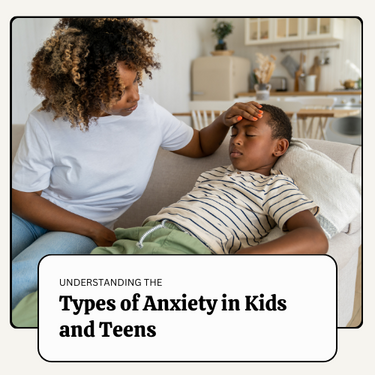
As a parent, it’s never easy to think about your child struggling with anxiety. But, multiple studies have shown that more kids are dealing with it than ever before. In fact, children can be more susceptible to anxiety and depression than adults, because they don’t fully know how to handle or process it.
That doesn’t mean there is a “one-size-fits-all” type of anxiety for children. There are several different types of childhood anxiety that kids of all ages can struggle with.
Knowing those types can make them easier to recognize. When you understand the most common symptoms, you can get your child the help they need sooner rather than later.
Let’s look at the most common types of anxiety in children and how you can spot them.
Generalized Anxiety Disorder (GAD)
The most commonly diagnosed type of anxiety is Generalized Anxiety Disorder (GAD). It can happen at any age, and the symptoms are often noticeable. They can have symptoms similar to panic disorder.
When a child is struggling with GAD, they might exhibit symptoms like excessive worry or irrational fears. In school, they may have trouble concentrating or staying focused. It’s not that they’re worried or focused on one thing in particular. Rather, they’ll experience random “triggers” or worrisome thoughts about different things, such as a test at school or a doctor’s appointment that ignites their irrational fears.
Selective Mutism
It’s not uncommon for children to be shy or nervous about speaking with others. But, when those issues go “too far,” your child might be dealing with selective mutism. Some of the common signs include:
Selective mutism isn’t caused by a communication disorder. Rather, it’s a type of anxiety that can cause your child to “freeze up” as a defense mechanism to make themselves feel more comfortable.
Panic Disorder
Panic disorder is a heightened version of GAD. Your child might feel like they’re losing control or have an overwhelming sense of fear and hopelessness. It’s not uncommon for physical symptoms to go along with panic disorder including:
If your child is so worried about a particular situation that they begin to panic, it could become a frequent problem, indicating panic disorder over GAD.
Specific Phobias
When your child has OCD, they might become hyper-fixated and obsessed with one thing. But that doesn’t necessarily mean they’re scared of that particular thing.
Phobias are different. They are very specific fears directed at particular things or situations. Some of the most common phobias for children include animals, enclosed spaces, spiders, flying, and the dark.
It’s important to know that there’s a difference between a child “being scared” of something and having an actual phobia. Many kids are scared of the dark. If your child has a phobia, they’ll experience severe anxiety when exposed to that particular thing.
Social Phobias
It’s easy to think of children as always wanting to “get out” and be around other people. But that isn’t always the case. Some children have social phobias. Some struggle with being around other adults, while some are even fearful about being around other children.
If your child has a social phobia, they will experience symptoms of anxiety when they have to be around a group of people or go to a large event. They might start to panic even before the get-together actually happens.
Separation Anxiety Disorder
Most children want to spend as much time as possible with their parents. But, if your child experiences irrational fear whenever you leave, they could be dealing with separation anxiety.
You’ve probably heard of separation anxiety disorder when it comes to pets. But, it can be just as prominent in children. They might refuse to sleep alone or worry about being apart from you. They might not even want to go to school or out with friends because they worry about what might happen when you’re apart.
As you can see, children can experience a variety of different anxiety disorders and struggles. Knowing some of the common signs and symptoms can make it easier for you to help them.
If your child is experiencing any of the above, don’t wait to get them the help they deserve. In most cases, anxiety is manageable. But, it doesn’t often go away on its own. It’s never too early or too late to get help. Doing so now can allow your child to thrive and grow into an adult without who learns how to manage fears and worries in a healthy way.
Is your child or teen struggling with anxiety or excessive worries? Don't wait to get help!
While it might not be easy to think about you or your child/teen seeing a therapist or counselor, it’s often the best way to get support. Connect with a therapist and get support today!

Sign up for our weekly newsletter to get instant access to parenting resources sent directly in your inbox!
